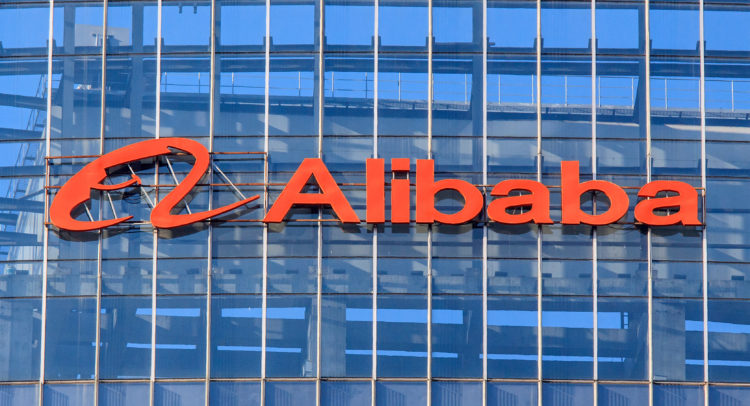Alibaba (BABA) is a Chinese multinational technology company operating in the e-commerce, retail, Internet, and technology sectors.
Like other tech behemoths, Alibaba got its start during the dot-com bubble in 1999. This company began trading publicly on the Nasdaq back in 2014, and has seen a significant amount of volatility over the course of its publicly traded life.
However, this past year has been something to behold. After hitting a high of more than $330 per share late last year, shares of Alibaba have have been on a steady decline. Currently, investors can pick up shares of this Chinese tech behemoth for around $130 per share.
Of course, any sort of substantial decline like this, especially for a blue-chip company like Alibaba, is the result of some serious headwinds. Such is the case for this tech behemoth.
I remain very bullish on this company, despite these headwinds. (See Analysts’ Top Stocks on TipRanks)
Government Crackdown
The Chinese government has ramped up its efforts to rule the economy with an iron fist. Concerns from the Chinese Communist Party (CCP) that various large corporations have grown in power too fast, and could challenge the ultimate authority of the government, have accelerated the government’s shift to crack down on what it sees as corruption and practices that are not in the best interests of society.
Alibaba was among the first companies targeted by the Chinese government in a string of crackdowns over the past year. An antitrust probe by the Chinese SAMR (State Administration for Market Regulation) into Alibaba’s e-commerce business drove most of this decline this past year.
Alibaba’s former face, Jack Ma, was effectively forced into exile, not being seen in public for months after giving a speech critical of the CCP. And Alibaba was ultimately fined $2.8 billion for its anti-competitive practices.
These headwinds all started approximately one year ago. However, since then, a series of additional crackdowns on Alibaba’s peers have furthered the idea that the entire Chinese tech sector should be avoided. That is, compared to companies in more stable markets such as the U.S.
The shuttering of Alibaba’s high-profile IPO of Ant Group (the company’s fintech arm) and a series of regulatory crackdowns on this business, have furthered this bearish sentiment of late. With corporations seemingly being forced to give up their profits, via reinvesting in State-approved growth areas, Alibaba shareholders appear to be on the hook for what could be a reversion from what was capitalism toward more hard-core communism in China.
In this context, Alibaba has pledged to contribute $15.5 billion in social equity funds to uplift Chinese prosperity uniformly. Officially, it is an attempt to help underdeveloped sectors and industries. However, an uncertain financial payoff, along with the timing and size of the funding, looks too generous to be voluntary.
Financials
Additionally, Alibaba is a company with a financial picture that is more murky than in the past. The company’s continuing to grow, despite its size. That said, Alibaba’s growth rate is currently slower than investors would like to see. Alibaba’s recent Q2 earnings report showed slowing growth, along with a revenue miss and lower-than-expected earnings.
That’s not good.
In the wake of these relatively lackluster earnings, along with concerns about the new coronavirus variant, Alibaba stock has tumbled to fresh 52-week lows. Investors appear to be looking outside of China for growth right now, with expectations increasingly favoring a bearish view on this once-unstoppable economy.
There’s a lot to be said about the economic progress made in China in recent decades. However, concerns that the political environment may change the course of the economy away from capitalism and toward an anti-business, communist model, has Western investors worried.
Potential
That’s not to say there’s a lack of potential with Alibaba. The company showed strong growth in its Cloud Computing segment this past quarter. Investors bullish on Alibaba’s future note that this growing segment could become the cash flow machine AWS is for Amazon (AMZN).
It may be too soon to tell if that will be the case. However, Alibaba is a tech conglomerate, in the truest sense of the term. The company owns a piece of many of the most innovative companies in China. For those bullish on the growth potential of China, Alibaba remains a go-to pick for many long-term investors.
Wall Street’s Take
As per TipRanks’ analyst rating consensus, BABA stock is a Strong Buy. Out of 23 analyst ratings, there are 21 Buy recommendations and two Hold recommendations.
The average Alibaba price target is $213.50. Analyst price targets range from a high of $275 per share to a low of $170 per share.

Bottom Line
The geopolitical risk that exists with Alibaba is real. Investors have reason to be dissuaded from considering this stock right now.
However, at multi-year lows, this is a stock that’s certainly worth considering. There’s a real value argument to be had with this hyper-growth stock. If Alibaba is able to pick up the pace of growth in the coming quarters, this is a stock that’s well positioned to go on another run like it did in 2020.
Disclosure: At the time of publication, Chris MacDonald did not have a position in any of the securities mentioned in this article.
Disclaimer: The information contained in this article represents the views and opinion of the writer only, and not the views or opinion of TipRanks or its affiliates Read full disclaimer >









